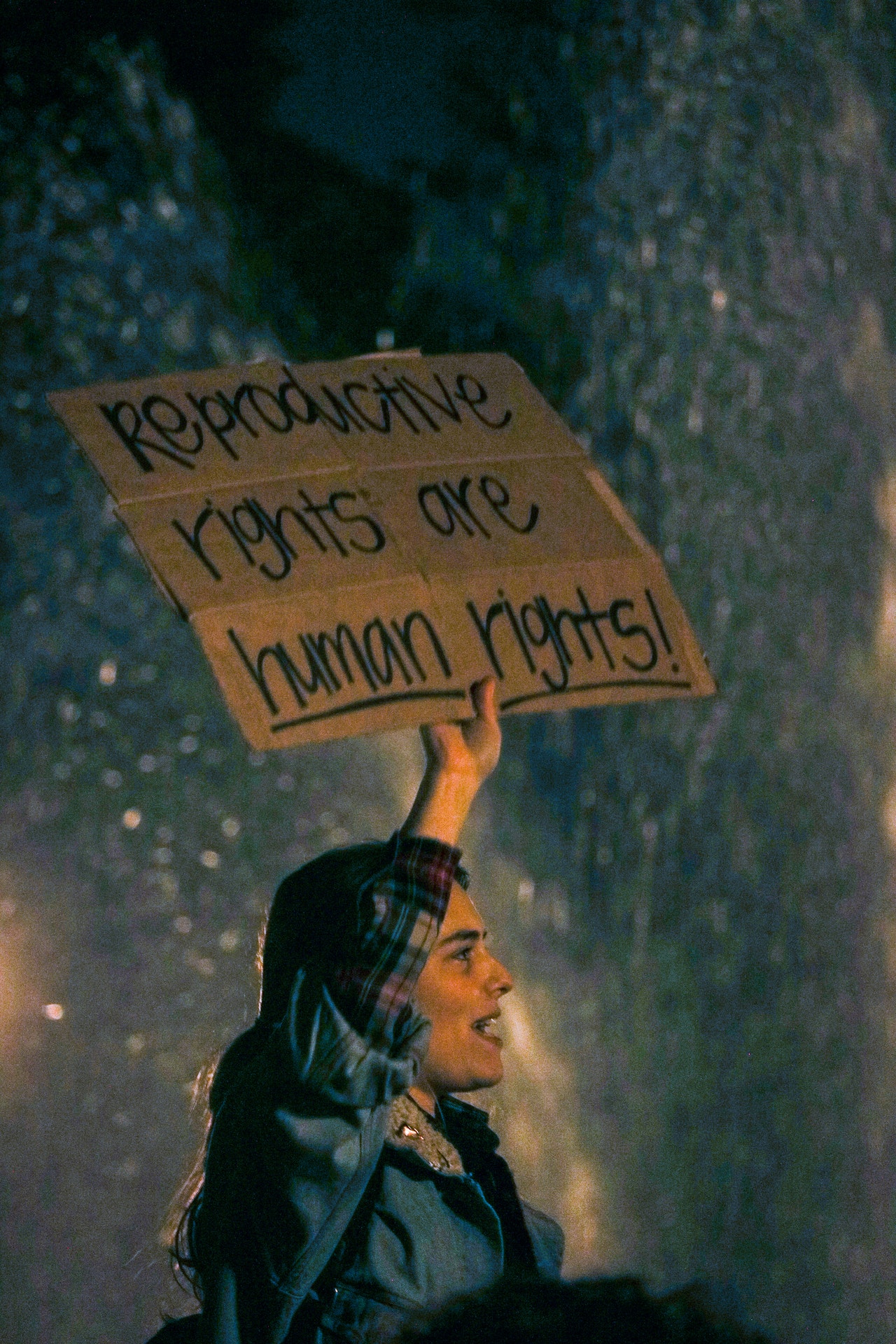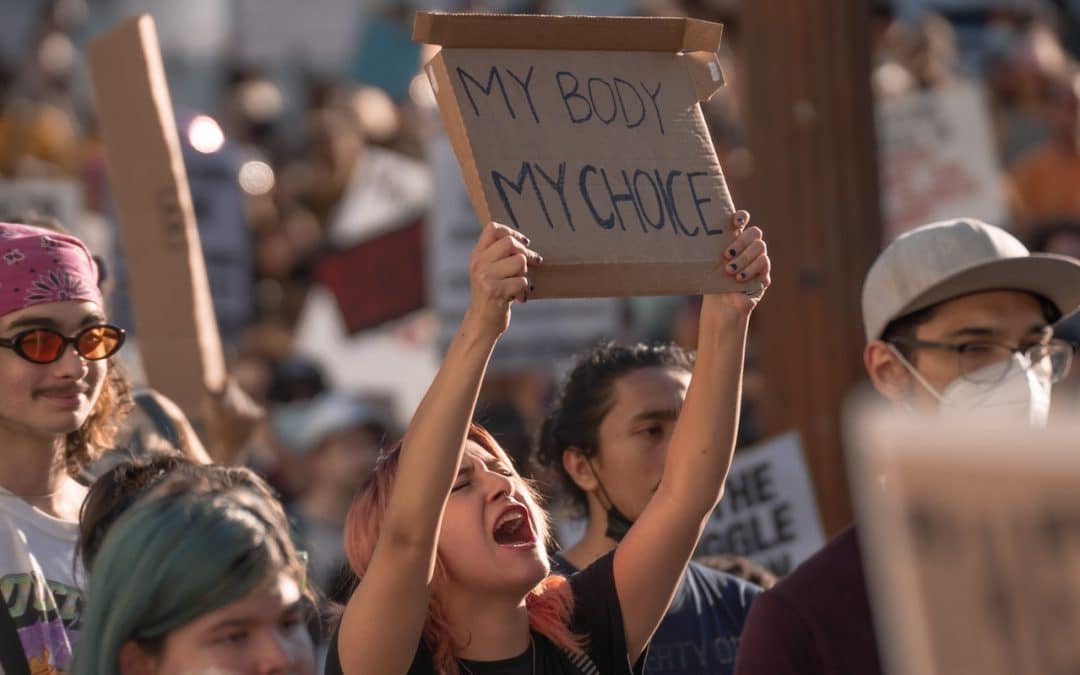We’re a couple of weeks into the post-Roe era, and I’m still feeling intense grief, rage, and a deep sense of betrayal. A similar feeling that many of my clients and colleagues have shared with me in their own stories recently.
There’s a long tradition in psychology that expects therapists to be neutral “blank slates” who keep politics out of the therapy office. As feminist therapists, we know that’s (1) impossible, and (2) likely to cause harm. When we attempt to be neutral, we often end up on the side of the same oppressive systems that hurt our clients and are incompatible with mental health. As long as people are oppressed, unsafe, or cut off from bodily autonomy and dignity, the mental health field will be political.
The Connection Between Abortion Rights & Mental Health
Abortion rights have been highly politicized, but abortion itself is a safe medical procedure with well-researched physical and mental health outcomes (see links below). Despite a stubbornly pervasive narrative that abortion is a cause of mental health issues, from depression to low self-esteem to post-traumatic stress, people who choose to have an abortion are no more likely to experience mental health problems like depression, anxiety, or suicidality. The vast majority of people who have abortions not only deny regret in the years afterwards, they most commonly report relief.
On the other hand, when someone is denied an abortion, there are a range of negative impacts to both parent and child. These parents have higher rates of anxiety, lower self-esteem, and overall life satisfaction. They also have worse physical health outcomes across a variety of measures, including premature death. Children of parents who were denied an abortion are more likely to grow up in poverty or abusive households, and have greater difficulty forming emotional bonds with their caregivers.

We know, too, that barriers to abortion care have disproportionately negative consequences for people from marginalized groups—poor women, trans and nonbinary people, people of color, queer and bisexual women—who already face worse mental and physical health outcomes.
For more information, I encourage you to read the recent American Medical Association and American Psychological Association statements, both of which include extensive citations on this research.
None of this is to say that the circumstances surrounding abortion, or the decisions that go into it, are always easy or painless. People have abortions for a wide variety of reasons, including poverty, unsafe or abusive domestic situations, medical and mental illness, disinterest in becoming a parent, and the health or viability of the fetus. As I read the many abortion testimonials that have been shared in the wake of this Supreme Court decision, the wide variety of experiences struck me: Stories of loss and grief. Stories of profound relief and gratitude. Stories of judgment and trauma incurred at the hands of family members, churches, “crisis pregnancy centers”, and even healthcare providers in attempts to control reproductive choices.
Abortion stigma has already been keeping individuals from accessing the support they need around these experiences. But now, the situation is far worse. As people in many states must look beyond their borders to access abortion services, there is a growing anxiety about the potential legal consequences of discussing abortion in therapy—a space where privacy and self-determination should be sacrosanct. As a psychologist, this is bone chilling and to be resisted at all costs. Everyone deserves a safe space to process all aspects of their reproductive choices and experiences, without an agenda beyond offering supportive and respectful care.
To be clear, as therapists in California, our work is very much shielded from these attacks at this moment. I’m enthusiastic about the steps our state legislature and governor are currently taking to protect access to care, shield healthcare providers from criminal and civil liability, and protect patients’ medical records. I am also looking forward to casting my ballot for a state constitutional amendment protecting the right to abortion this November. But Californians are not in the clear. We must remain vigilant to ongoing erosion of privacy and freedom at the federal level, for ourselves and in solidarity with our counterparts in other states.
This July, Stella Nova Supports the National Network of Abortion Funds
At Stella Nova, we’re guided in all that we do by our five core values: Feminism, mental health, science, community and employee wellness. The attack on abortion access is an attack on each and every one of those values.
For this reason, our team has decided that this year, for Stella Nova’s annual Month of Giving, we will be donating a portion of our fees collected in July to the National Network of Abortion Funds – $5 from every therapy session we hold this month.
We chose this organization because we believe in getting money into the hands of grassroots organizations who have been doing this work, on the ground, and continue to provide essential practical and material support for people seeking abortion. We typically opt to support local organizations who are doing work here in our communities. However, we recognize the urgency of funding organizations protecting abortion access at this juncture. We also acknowledge that communities in other states are currently being disproportionately impacted. NNAF distributes donations to more than 80 partner organizations within their network around the country.
We will keep you updated about our progress and invite you to donate as well!
About the Author
Maya Borgueta, PsyD, is a licensed clinical psychologist and the founder of Stella Nova Psychology, a California psychotherapy clinic that supports offers individual and couples therapy, with a focus on the needs of women of color.
She is also a passionate, lifelong pro-choice feminist, and brings an intersectional lens to her therapy work.
Online Therapy for Women in California
Looking for a therapist who shares your values? Stella Nova Psychology is an enthusiastically feminist practice that offers online therapy for women and nonbinary adults, and couples of all genders. We’re a majority-BIPOC, LGBTQ+ affirming practice that strives to infuse intersectionality into everything we do.
Stella Nova therapists specialize in a variety of mental health concerns including anxiety, depression, chronic pain, perinatal mental health, burnout and more. Get matched with the best online therapist for your needs and preferences by scheduling a free, 20-minute consultation today!


